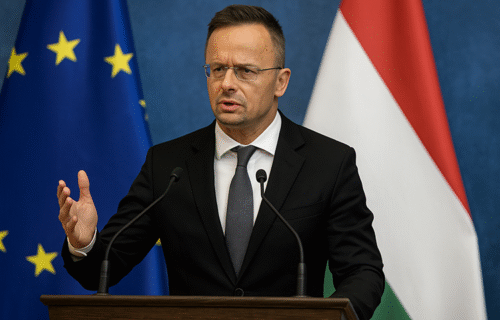Hungary’s government continues to test the limits of Brussels’ patience, pursuing a foreign policy that places national energy security and sovereignty above EU solidarity. Foreign Minister Péter Szijjártó’s latest trip to Moscow — his thirteenth since Russia’s invasion of Ukraine — has reignited criticism from fellow member states, but it also underscores Budapest’s consistent message: Hungary will not compromise its access to reliable energy supplies.
At the heart of the dispute lies Hungary’s insistence that its energy policy is a matter of survival, not politics. Officials in Budapest argue that the country’s dependence on imported fuel, coupled with its landlocked position, leaves few alternatives to existing pipeline arrangements with Russia. While the EU is pressing ahead with plans to phase out Russian energy imports by 2027, Hungary maintains that this timeline is unrealistic and potentially damaging. The government insists that current supply routes — including the Druzhba pipeline — are critical to the stability of both prices and domestic industry.
By attending an energy forum in Moscow and defending long-term contracts with Russian suppliers, Szijjártó sought to reinforce Hungary’s view that cutting off traditional energy partners too quickly could create more risks than benefits. “Diversification cannot mean giving up secure routes,” he told journalists before leaving for the conference, reiterating that Budapest supports gradual, not forced, change.
This stance has drawn a sharp rebuke from the European Commission, which argues that the visit undermines the bloc’s united position toward Moscow. EU officials maintain that reducing dependency on Russian energy is not only a political necessity but also an economic safeguard against future shocks. Yet, Hungary’s leadership views its engagement with Russia as pragmatic — a way to balance energy reliability with fiscal stability at home.
Analysts say Hungary’s approach is part of a broader strategy to assert autonomy within the EU while leveraging its position for concessions. By taking an independent line, Budapest signals that it expects Brussels to acknowledge its specific vulnerabilities and adapt policy timelines accordingly. The tactic has, at times, yielded results, such as negotiated exemptions from energy sanctions and additional funding flexibility.
Behind the confrontations, however, lies a deeper calculation. Hungary’s leaders are not seeking to isolate themselves from Europe but to shape the debate around what they see as a more realistic path toward energy security. “We are not against diversification,” one government source noted recently, “but we must ensure that the lights stay on while others debate the rules.”
As the EU finalizes another sanctions package against Russia, Hungary’s resistance highlights the growing tension between collective European principles and individual national interests. Whether Budapest’s strategy secures practical benefits or deepens its political isolation may depend on how far it continues to test the boundaries of Brussels’ tolerance — and how the rest of Europe chooses to respond.
